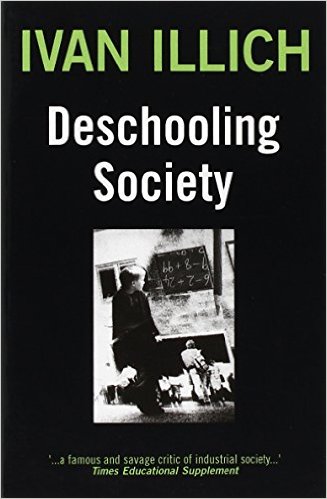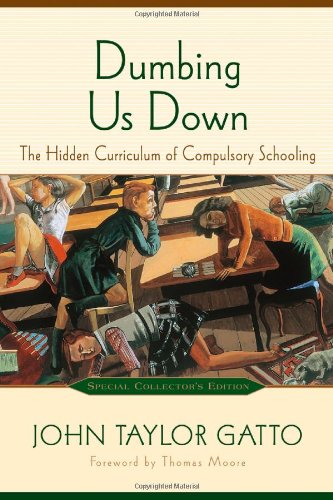
Ivan rages against the machine. He rages so much that the book might as well be considered the pioneer of Rap Metal with how angry it is. Has intellectual writing ever been so energetic, so kinetic? The medium of text isn’t very good with emotions. It is, after all, just ink on paper. It can explain an idea, but the sensory experience of taste and touch, the emotions of anger and sadness can never be summed up with words. Deschooling Society is an expressive book.
The comparison to the political ‘rap’ metal band (Zack cannot rap for shit) doesn’t end with simply raging and machines. Rage Against the Machine made impressive noise that was fun as it lacked insight. Anyone reading the band’s lyrics will only hear some frustrated dude screaming about taking the power back and how we should settle for nothing. These are great lyrics for rock shows, but they mean nothing. Illich’s situation isn’t that bad, but it’s close.
His paragraphs are often a series of attacks without much explanation or defining terms. Without defining terms, you cannot have a sensible discussion. Every word is just a collection of syllables or symbols until you attach meaning to it. If you don’t explain what you mean by ‘learning’, what are you discussing? Illich operates in the realm of the abstract. He doesn’t talk about physical objects like rocks or guns or tables, which are easier to define.
Many concepts we use everyday aren’t defined well. Schools are a perfect example of how warped our concept of ‘learning’. I agree with Illich that schools don’t cause learning, but I never understood what Illich meant when he was talking about ‘learning’. When Postman attacked the education system, he had an idea of what ‘learning’ should be. In general, ‘learning’ for Postman is finding meaning in data. That’s why he provided some narratives that schools can adopt. For him, knowing a bunch of equations isn’t learning but just gathering data.
In fact, it seems Illich’s ideas about what learning is, are close to what schools say about learning. He claims schools must provide people resources for information, but is it enough? We’re currently living in the age of information. The internet doesn’t have all the info you need, but you can use it to track down enough.
Yet are we learning? Are we being flooded with intellectuals and philosophers making breakthroughs everyday thanks to all that information available? It’s not enough for information to just be available. You can’t publish a book that contains an essay about history, an essay about psychology and some sport statistics. Connecting pieces of data is the actual process of learning. It’s what separates active organism, which observe their environment and react to it from passive ones. The octopus realizes he can push the lid off or use a stick to beat a shell. The squid doesn’t.
Then again, Illich’s gripe isn’t so much with schools themselves as with institutions. Talk about being able to connect pieces of data. Illich has some interesting things to say about institutions, especially the idea that some create the demand for their product. What he says about our reliance about institutions is especially important.
We do rely on institutions a little too much. How many of you met friends through places that are not work or school? When I talk about how harmful schools are, I often hear about how school is important because it’s where you meet friends. Yet how deep can these connections be when the main common ground is an institution? What connects people are shared experiences, common ground and chemistry. Some of it institutions can create, but it says a lot about our society when we have a hard time meeting people outside workplaces or schools.
Some institutions are necessary. I wish he’d gone in-depth about why hospitals are so wrong. Medicine is a serious subject. There should be authority figures in it, because screwing up in medicine means causing often irreversible harm. Imagine if an uncertified doctor performed a surgery. We have institutions like hospitals to make sure only the experts perform difficult and dangerous activities. Yes, they are trustworthy. Imagine a doctor screwing up a surgery so bad that the patient dies. Can the secret be kept?
Illich admits not all institutions are the same. He offers a scale which includes on one side institutions that promote activity. These institutions provide services, but the client has a lot of options and can quit or stay any time. They’re toolboxes the client can run with. Authoritarian institutions punish and force clients to stay. They give them something to consume, but the client is more passive.
That’s an interesting thing to explore that Illich doesn’t. He’s too busy ranting. If institutions aren’t all the same, then you can’t create several groups and be done with it. The military and the schools are both fucked, but for different reasons. If Illich wanted to show that authoritarian institutions are problematic by nature, he needed to go more in-depth into why they fail. He needed to present many examples and show why despite the differences their effect is overall bad.
His ideas about ‘learning webs’ are important. He may not define what he means by ‘learning’, but his ideas how to do it are useful. He offers more social, more open ways of educating and teaching. The most important idea here is the web itself. Illich proposes a computer (nowadays it’d be an app) where people can insert their subject of interest and then connect with others who share the same passion. No, the internet hasn’t provided this yet. Reddit is too impersonal. Facebook groups are messy. Illich doesn’t talk about a message board but a private chat. His program would encourage people to meet to explore their subject further, not just discuss it on the internet.
He’s a bit too ahead of his time. If he were alive today to see how message boards rise and fail, I’m sure he’d either taken the initiative or write a more detailed essay about this. As it stands, the idea is buried here. Someone should run with it. I should nag my programmer friends and hopefully it’ll spawn copycats. It’s so simple, but so brilliant. Offering an easy platform for people with the same interests to talk to each other.
The last chapter is ridiculous and a little insulting. All that praising of a primitive men reeks of the Noble Savage cliche. The problem with praising or condemning the primitive is that we don’t know exactly how they lived. We imagine them as peaceful or in harmony with nature or living perfect lives, but that’s just the Fall of Adam story without the Jewish stuff. Besides, if the primitive life was so good why did the primitive ended it? Why did they build fires, invent writing and used tools? If life was so good for them, they wouldn’t starve for change.
As a critique of schools, Deschooling Society is disappointing. It shows a bit of the economical side and has a less spiritual approach than, say, Dumbing Us Down. Illich has some insight and good ideas. His critique of the general nature of institutions is needed when discussing schools. Although Neil Postman wrote a great book, he didn’t consider deschooling. Sadly, Illich is too excited over his ideas to explain them coherently, to slow down and define his terms. There are building blocks to take from here, but this isn’t going to revolutionize your philosophy of education.
3 institutions out of 5

